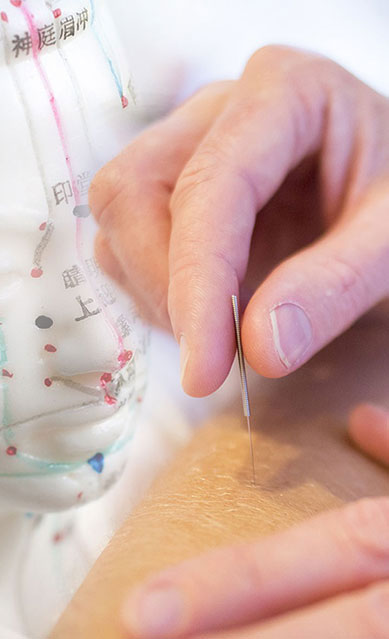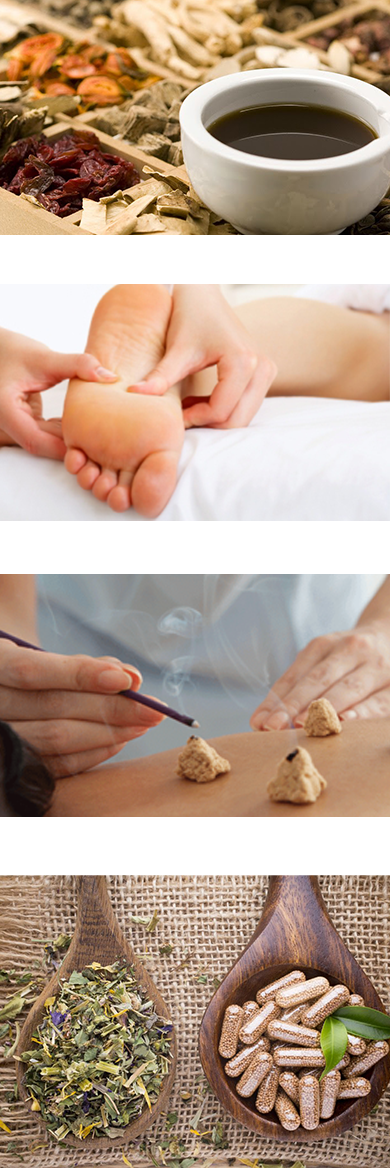The goal of traditional Asian medicine is to recover balance in our bodies.
Disharmony can occur when any aspect of our being is over- or underutilized. Stress, sleep patterns, and other information point to the sources of what we refer to as a person’s “pattern of disharmony.” Understanding the root of the problem helps us treat symptoms with Irvine Family acupuncture, bodywork, lifestyle changes (including exercise), new dietary guidelines, and/or herbal therapy.
Acupuncture
As part of the Traditional Chinese medicine acupuncture restores and maintains health through the stimulation of specific points on the body. Acupuncture is the practice of puncturing the skin with needles at certain anatomical points in the body to relieve specific symptoms associated with many diseases. The anatomical points (acupuncture points) are thought to have certain electrical properties, which affect chemical neurotransmitters in the body. Acupuncture is one of the oldest, most commonly used medical practices in the world. Acupuncture originated in China more than 2,500 years ago. It gained attention in this country in the 1970’s, when relations were opened between China and the U.S. How does Acupuncture work? While Acupuncture has been scientifically proven to be effective in treating maladies ranging from pain to seasonal allergies to insomnia, the mechanisms by which it works are still subject to debate and may be described differently by different providers. The simplest answer, from a modern Western medical perspective, is that tiny Acupuncture needles inserted into the skin promote blood circulation to targeted areas. This in turn activates your body’s immune and nervous systems, reducing inflammation and releasing endorphins to alleviate pain. Acupuncture is rooted in a history that spans more than 2,000 years, and Eastern-based practitioners would probably describe Acupuncture’s effectiveness differently. Acupuncture helps to correct imbalances in the body caused by external factors such as stress, toxins, and injury. Once restored to proper balance, the body can better heal itself.

Traditional Chinese medicine
TCM (Traditional Chinese Medicine) has roots that extend back 3000 years. It is a system of diagnosis, treatment and preventative care that includes acupuncture, acupressure, herbal treatments and massage to help preserve healthy “ climates or conditions" within the body. In Chinese medicine it is felt that the best “cure” for sickness is prevention, as opposed to Western medicine, which focuses in repairing or curing.
Acupressure
Our bodies are filled with energy, called “QI”(pronounced “chi”) by the Chinese. Chi flows through the body in energy pathways called meridians. Meridians function something like rivers made of energy. If there’s a blockage along a channel, the area after the blockage may be weak, like a river that’s been dammed. If a channel or meridian has too much energy, then the pathway may be sore, since the Chi is trying to overflow its banks. In both cases, the body’s entire energy system will be affected, with symptoms ranging from stiffness to sickness. Acupressure uses thumbs, fingers, and/or hands to remove blockages or slow excess energy. It can help rebalance the body and bring it back to health.
Moxibustion
Moxibustion is a traditional Chinese medicine technique that involves the burning of mug wort, (wild plant leaves) and small, spongy herb to facilitate healing. The purpose of moxibustion is to strengthen the blood, stimulate the flow of qi (chi), and maintain general health.
Homeopathic Medicine
Homeopathic Medicine is based on the use of natural substances. Regulated by the U.S Food and Drug administration, to treat acute and chronic illnesses and prevent diseases. Homeopathic drugs are made of plant, animal or mineral substances. This therapy treats ailments with very small amounts of the same substance that causes the patient’s symptoms.
Herbal Supplements
Herbal Supplements are products made from plants for use in the treatment and management of disease and certain medical conditions. Many prescription drugs and over-the-counter medications also are made from plant derivatives, but these products contain only purified ingredients and regulated by the FDA. Herbal supplements may contain entire plants or plant parts; moreover, they are considered foods, not drugs by the FDA, therefore, are not subject to the same regulations as traditional medications.

